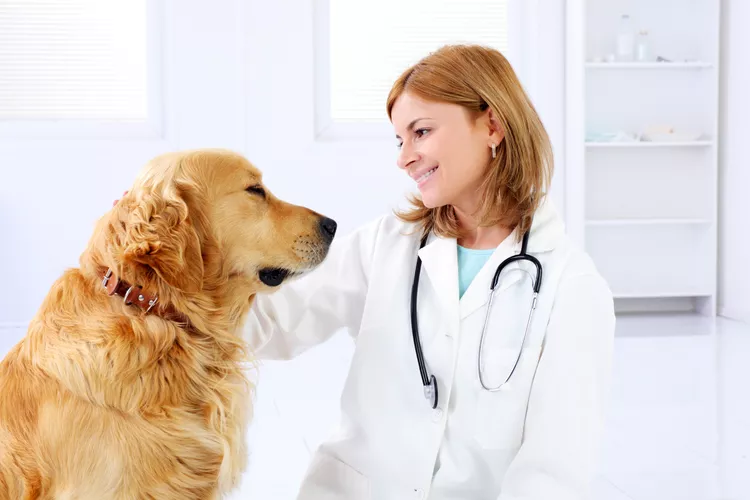Swollen Lymph Nodes in Dogs

Lymph nodes are found in various places in the body. These small glands are not typically easy to find or feel unless they become enlarged. Swollen lymph nodes usually occur as a result of infection or disease, especially in the area of the swollen nodes.
Knowing the potential reasons for swollen lymph nodes and what to watch for can help you better monitor the health of your dog. While the lymph nodes themselves rarely require treatment, the underlying condition causing their swelling may be severe and should be evaluated by a veterinarian.
What Are Swollen Lymph Nodes?
Lymph nodes are small glands in the lymphatic system that help regulate a dog's immune functions. These nodes help transport infection-fighting lymph fluid and white blood cells through the body via lymph vessels. When lymph fluid and white blood cells aggregate in lymph nodes to destroy toxins and infectious materials, this accumulation can cause swelling of the nodes.
Symptoms of Swollen Lymph Nodes in Dogs
Swollen lymph nodes are often an indicator of an infection or disease process occurring in a dog's body that may have its own unique signs and symptoms. The lymph nodes themselves become enlarged and firm in response to the underlying problem.
Lymph nodes can be felt in four areas of a dog's body where these glands become prominent when swollen:
- Mandibular: Under the chin, on either side of the neck
- Popliteal: On the back of the hind legs, behind the knees
- Prescapular: On the chest, in front of the shoulders
- Inguinal: In the groin
Causes of Swollen Lymph Nodes
Enlarged lymph nodes may be referred to as lymphadenopathy or lymphadenomegaly until the reason for the enlargement is determined. One or multiple lymph nodes can become swollen, and this typically occurs due to an underlying disease or infection. If you notice a lump where your dog's lymph nodes are, you should not wait to have it examined by a veterinarian.
Some of the common underlying causes of swollen lymph nodes include:
- Lymphoma: The most common reason for enlarged lymph nodes is a type of cancer called lymphoma. There are over 30 types of lymphoma in dogs, but most of them start in the lymph nodes. This type of cancer involves white blood cells and can affect multiple parts of a dog's body.
- Reactive hyperplasia: This cause of swollen lymph nodes is benign. It is an indication of the immune system working hard. It may occur due to an infection that the body is fighting.
- Lymphadenitis: This means a lymph node is inflamed. It may occur due to an infection that has resulted in chronic inflammation. Systemic bacterial, viral and fungal infections, and some parasites may cause this type of lymph node enlargement.
- Hemorrhage: If surrounding tissues are damaged due to trauma or disease, hemorrhage of the lymph node may occur, causing swelling. It may also be seen in dogs with bleeding disorders.
- Mineral-associated lymphadenopathy: While no one understands exactly how this happens, mineral-associated lymphadenopathy occurs when various minerals accumulate in the lymph nodes. These minerals cause the lymph nodes to enlarge.
Diagnosing Swollen Lymph Nodes in Dogs
If your dog has enlarged lymph nodes, your vet will first perform a physical examination. This will help determine how many lymph nodes may be affected and the reason for the enlargement.
Blood tests to check organ function and white blood cell numbers are typically performed, but a fine needle aspirate (FNA) will also be recommended. This involves inserting a needle into the lymph node in order to collect cells that may indicate the reason for the enlargement. If the FNA is inconclusive, a lymph node biopsy may be performed under anesthesia. This will allow a better look at the lymph node tissue.
Further tests may be needed for various infections depending on what your veterinarian suspects based on symptoms and test results. These may include a urinalysis, fecal test, X-rays, and ultrasounds.
Treatment
Various medications including steroids, anti-inflammatories, antibiotics, anti-parasitics, and even chemotherapy may be recommended depending on the reason for the lymph node enlargement. Surgery or radiation are other treatment possibilities, especially for low-grade, localized lymphomas.
Prognosis for Dogs With Swollen Lymph Nodes
The long-term prognosis for a dog with swollen lymph nodes can vary considerably depending on the cause and stage of the underlying condition. Prompt treatment can be very important for conditions that result in enlarged lymph nodes.
How to Prevent Swollen Lymph Nodes
Some dog breeds appear to have a genetic predisposition for developing lymphoma, but no one knows for sure. These breeds include golden retrievers, boxers, bullmastiffs, basset hounds, Cocker spaniels, Irish wolfhounds, Saint Bernards, Scottish terriers, Airedale terriers, and bulldogs. If a dog has a history of lymphoma, it should not be bred to prevent the likelihood of this cancer in its offspring.
Other reasons for lymph node enlargement are difficult to prevent. Overall, just keeping your dog healthy through diet and exercise can help decrease the likelihood of illness and infections that may result in lymph node enlargement. Proper nutrition, regular veterinary attention, and practicing good hygiene are all things that may aid in your efforts.